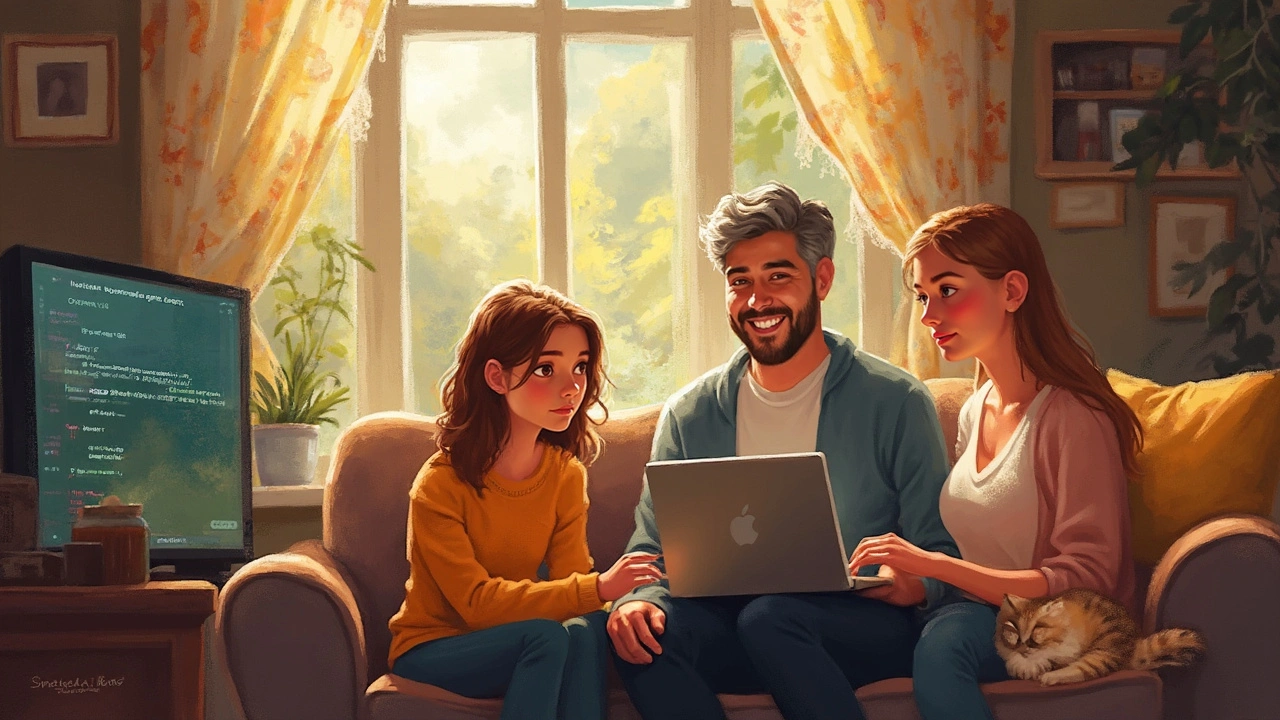Ever wonder why coding is such a big deal these days? It's not just for the tech wizards anymore. As tech continues to seep into every corner of our lives, having some coding know-how can really set you apart. Think of it as learning a new language, but instead of just speaking, you also create amazing stuff, like apps or websites!
If you're thinking that coding is just for IT folks, think again. From marketing to healthcare, a little coding knowledge can give you a huge boost. It makes you more adaptable, improves problem-solving skills, and frankly, makes you a bit of a rockstar in your field. Ready to dive into the world of coding? It's not as scary as it sounds, and trust me, it's worth every bit of the effort!
- Why Coding Skills Matter
- Coding in Everyday Jobs
- Getting Started with Coding
- The Future of Coding
- Practical Tips for Learning
Why Coding Skills Matter
Let’s face it, we're living in a digital age. Everything around us is powered by technology, making coding skills more crucial than ever. It's not just about landing a job in tech; it's about understanding the world we're part of. Even if you're not looking to become a software developer, knowing the basics of programming can give you a serious leg up.
Think about all the gadgets you use daily—your smartphone, computer, or even your smartwatch. Behind each of these is a universe of code. By learning to code, you get to peek behind the curtain and understand how these things tick. It's like having superpowers—only you can build apps instead of scaling walls. Coding enables you to automate mundane tasks, solve complex problems, and even build your own little digital helper.
On the career front, coding can drastically improve your prospects. A LinkedIn report highlighted that skills like Python and Java are among the top in-demand skills. Companies are on the lookout for people who can bring more to the table than just their job title. They want folks who can innovate, problem-solve, and understand tech on a deeper level. This is where having some programming expertise can make you stand out.
But there’s more to it than jobs—learning to code improves your problem-solving skills. It teaches you how to break down a problem into smaller parts and tackle each one step-by-step—a life skill useful far beyond programming. Plus, once you’ve mastered one language, learning others becomes easier. It’s like mastering a musical instrument and then picking up another.
Here's a cool stat: By 2030, it's expected that coding skills will be required in 30% more jobs than today. That’s how rapidly things are changing! If you’re not up to speed, you might find yourself playing catch-up in a fast-paced world.
In short, whether you’re aiming to enhance your career, start a side hustle, or just want to be the genius who automates their home with a couple of lines of code, picking up coding skills is a smart move!
Coding in Everyday Jobs
Ever think coding only matters if you're in IT? Think again! From accountants to artists, coding skills are popping up as handy tools in all sorts of unexpected places. It's like a secret superpower that everyone is tapping into. Why? Because the digital world is everywhere, and being able to speak its language is a massive plus.
Marketing teams, for example, are using coding to better understand and reach their audience. Imagine tweaking your company's website on the fly, adjusting for better user experience, or even analyzing big chunks of data to pinpoint the latest trends. A marketer with basic coding skills can do all that without having to ask the IT team for help.
"In today’s digital age, coding literacy is as important as reading and writing." – Dr. John Smith, Tech Visionary
Even in healthcare, coding plays a game-changer role. Doctors and nurses aren't expected to write complicated algorithms, but understanding electronic health records and utilizing new tech tools effectively can make a huge difference in patient care. This shift is making healthcare workers more efficient and effective.
Artists, on the other hand, are fusing tech with creativity by designing interactive installations or digital artwork, often using coding as the bridge. It's opening up a whole new way to create and inspire.
Let's put it into perspective with some stats. Did you know that about 70% of new jobs require at least some digital skills? According to a recent report, jobs that require coding skills pay more, with salaries averaging around 26% higher than non-coding jobs. That's a serious incentive right there!
| Sector | Use of Coding | Impact |
|---|---|---|
| Marketing | Web tweaks, Data analysis | Better user engagement |
| Healthcare | Health records, Tech tools | Improved patient care |
| Art | Digital installations | Enhanced creativity |
So, whether you're designing a new ad campaign, diagnosing a patient, or crafting a digital masterpiece, knowing a bit of coding can definitely spruce up your professional toolkit. It's not just a skill for techies anymore; it's a skill for everyone.

Getting Started with Coding
So, you've decided to dive into coding skills, but where do you even begin? Don't worry, it's not as daunting as it looks. The key is to start small, and there are plenty of resources out there to help you do just that.
First things first—choosing a programming language. For beginners, languages like Python or JavaScript are ideal because they're both versatile and relatively easy to pick up. Python is known for its readability and is great for data analysis and automation, while JavaScript is essential if you're interested in web development. These languages form the backbone of many tech applications we use daily, so getting your head around them opens up tons of possibilities.
Once you've picked a language, the next step is to find the right learning materials. Online platforms like Codecademy, Coursera, and freeCodeCamp offer structured courses that cater to both newbie and intermediate programmers. Want something more hands-on? Dive into interactive coding games like CodeCombat or Codingame, which make learning feel like a fun challenge rather than a chore.
Don't underestimate the power of community either. Platforms like GitHub host a ton of open-source projects you can contribute to. It’s a great way to learn from others while practicing your skills. Plus, communities like Stack Overflow offer support when you get stuck. Just remember, everyone was a beginner once, so no question is too small.
Another cool way to boost your programming knowledge is through hackathons. These coding marathons focus on solving real-world problems, which not only improve your skills but also look pretty spiffy on your resume.
Finally, set achievable goals. It could be as simple as building a basic website or automating a repetitive task. The satisfaction of completing a project is a massive confidence booster, and before you know it, you'll be coding your way into new opportunities in our tech-driven world.
The Future of Coding
Alright, let's talk about the future. Ever heard the saying, "The only constant is change"? Well, in coding, that's doubly true. The tech scene is shifting faster than a kangaroo on a trampoline, and the demand for coding skills is skyrocketing.
We're not just talking about Silicon Valley tech firms. Many industries, from farming with smart tractors to fashion with AI-generated designs, are crying out for coding-savvy folks. The World Economic Forum even listed programming as one of the top skills needed by 2025.
Now, what about all these talks of AI threatening to replace coders? Sure, AI tools are getting good, like really good, but they won't replace human creativity and problem-solving anytime soon. Think of AI as a teammate that can crunch data, while you focus on the fun parts—creating cool, innovative stuff that stands out.
There's also the massive trend of low-code and no-code platforms popping up. These tools are making it easier for people who aren't professional programmers to create software solutions. But guess what? This doesn't mean coding is out. It means the opportunities are broader, and basic knowledge of programming makes you exploit these platforms even better.
To give you a glimpse of the tech tomorrow, imagine coding embedded into our education systems from an early age, just like math or science. Coding goes mainstream, and who knows, your kid might grow up not just reading books, but coding their own while they're at it!
In a nutshell, coding is here to stay, and it’s evolving. Fancy being part of this future? Now might be the best time to sharpen those digital skills because the world's not waiting up!

Practical Tips for Learning
So, you're ready to dive into the world of coding? Awesome choice! Whether you want to enhance your career or just try something new, learning to code is a game-changer. But it can feel a bit overwhelming at first, right? No worries, I've got some tips to make it a smoother ride.
First up, don't try to learn everything at once. Pick one programming language to start with. Python is a fan favorite because it's easy to learn and super versatile. Once you feel comfy, you can branch out to other languages like JavaScript or Ruby.
Next, practice is your best friend. Use platforms like Codecademy or freeCodeCamp. They've got tons of cool projects to work on. Plus, they structure their courses in a way that keeps you engaged. Try to code something every day, even if it's just a little bit. Consistency is key.
Don't underestimate the power of an online coding community. Join forums like Stack Overflow where you can ask for help, or Reddit groups dedicated to programming newbies. Sharing experiences and solutions with others can boost your confidence and help you solve problems faster.
Here’s a quick starter guide:
- Choose your language: Python or JavaScript are great for beginners.
- Find a learning platform: Codecademy or freeCodeCamp are both excellent.
- Set daily goals: Even 10 to 15 minutes a day can make a big difference.
- Join a community: Get involved in coding forums or social media groups.
- Build projects: Start small, like a calculator, and work your way up.
Remember, coding is a journey, not a sprint. Even the pros started as beginners, so keep pushing, stay curious, and most importantly, have fun with it!

